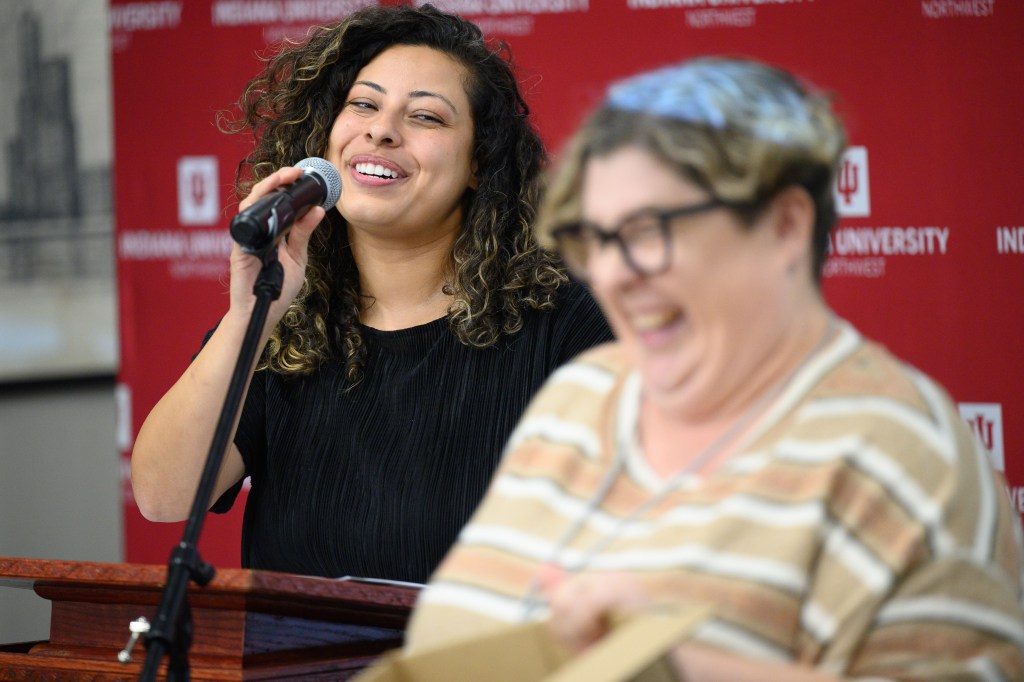There can never be too many organizations helping moms with new babies find their footing, and when they work in tandem, they’re darn near unstoppable.
Three such organizations gathered at the Second Annual World Food Day Celebration Thursday afternoon at Indiana University Northwest to explain who they are and what they do. They presented their programs, but a Q&A at the end of the segment revealed they’ve all ended up working together, largely because their clientele overlaps, said Jennifer Corral, Farmers Market Coordinator for the NWI Food Council, which started celebrating World Food Day at the campus last year.
“Michiana Nurse-Family Partnership helps women who’re just giving birth for the first time and focuses on infant mortality, while Healthy Families at Dunebrook supports families with children up to 5 years old, and (NWIFC’s) Market Mamas gets healthy food to families through our programs,” Corral said.
“We’ve found that our clients are often the same families who’ve come up through each program, and they communicate with each other, so that’s helpful.”
Each program’s food component has the same goal: to get families to think about what they’re eating and to make better choices while meeting them where they are. That includes not shaming them when they don’t immediately agree to adding Swiss chard to their grocery lists.

“When you have a finite amount of money to purchase food, and your child has spit something you’ve tried out, you’re not going to want to buy it if it’s going to go to waste. And that’s OK,” said Erin Stojic, administrator for Michiana Nurse-Family Partnership. “These are families who often don’t have access to anything more than the gas station up the street. It’s not about food; it’s about dignity and humanizing their experiences.”
Just meeting with new families is fraught with stress and trepidation, the women agreed. Amy Wisor, Community Outreach Coordinator for Dunebrook, never walks into a hospital room without a book, for example.
“We’re used to talking to families when they’re super-vulnerable, so here I am: ‘I have a book for your baby!’” she said. “But we’re a program that comes to you to help build your baby’s brain, and that includes food as a protective factor. We show you how to access your food banks and your farmers markets while destigmatizing the experience, because you don’t have to be on the last bean in your cupboard before using these resources.”
To get a kid to try new foods, getting them involved in the process goes a long way, the women agreed. Growing bucket gardens, going to cooking events and reading them books that frame experiences around food are great tools, Wisor said.

You’ll often see them taking bites out of the things they’ve grown themselves, she said.
“Play-based efforts really do work,” she said. “We need to show them that food and eating is joyful, not stressful and scary.”
The first part of the event, which was hosted by the school’s Center for Urban Excellence and School of Public and Environmental Affairs, focused on presentations, while the evening saw the premiere of “Nourishing Lives: The Power of Food is Medicine,” a documentary about Gary’s FAITH CDC directed by State Sen. Mark Spencer, D-Gary.

The film showcases how the idea of “Food is Medicine” not only addresses health disparities but also tackles food insecurity in our communities.
A panel discussion with participants, policymakers and partners followed.
Michelle L. Quinn is a freelance reporter for the Post-Tribune.


